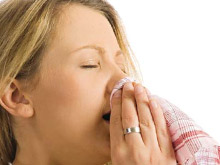Health Topics
-
Healthy Living
-
|
|
April 2010
|
| Summer Infections |
| Dr Lavanya Nutankalva |
| |
 |
Summer holds risks such as heat, skin cancer and even tetanus. No matter what summertime activity you choose, the hot and humid days can take a toll. It is very common to forget the ill effects of summer when you are having loads of fun. But if you incorporate regular healthy habits, you can stay healthy and enjoy yourself much more.
|
The summer season holds risks of viral, bacterial and parasitic infections, infections spread by carriers like mosquitoes, eye injuries, and of course, illnesses from water and food.
Viral Infections
1. Polio, an enterovirus, is the most notorious illness caused by a summertime virus. In the 1940s and ‘50s, parents would refuse to let children go outside and play because of the fear of the poliovirus! Children who were infected by this virus would have mild sore throat and fever, and then could even develop meningitis and/or paralysis. But because of routine immunisations, the threat of this disease is almost eradicated.
2. There are other enteroviruses which can cause illnesses, like group A and B coxsackieviruses and echoviruses. They cause mild respiratory (cough and runny nose) and gastrointestinal (diarrhoea and vomiting) illnesses. They can also cause aseptic meningitis, encephalitis (acute inflammation of the brain) and myocarditis (inflammation of the heart muscle).
3. Hand, foot and mouth diseases are caused by the Coxsackie A16 and Enterovirus 71 viruses. These cause blisters or ulcers in the mouth, hands or feet. Ulcers can also occur just in the mouth, called herpangina.
4. Parainfluenza virus 3 which causes croup, bronchiolitis, pneumonia or just a cold, will also be lurking around. The characteristic barking cough of croup makes this virus easy to identify in summertime.
5.Adenoviral infections though more common in winter, can also occur in early summer. The affected person will have fever, sore throat and other upper respiratory tract infections. Adenovirus can also cause a kind of fever (pharyngoconjunctival fever), leaving you with a sore throat, fever and red eyes without discharge or matting.
Vector Borne Infections
Infections spread by carriers (vectors) raise their ugly heads during this season. Mosquito-borne infections (arboviruses) like West Nile Encephalitis, St. Louis Encephalitis and Dengue fever are more common in the summer, specifically late summer. Tick-borne illnesses like lyme disease (which starts with a large expanding skin rash), Rocky Mountain Spotted Fever (what starts as small, flat pinkish rash spots going on to affect internal organs, even becoming fatal), and ehrlichiosis (which kills white blood cells) are also common.
Water and Food Borne Illnesses
Warmer weather, which help bacteria multiply faster, and the increased number of cookouts and picnics in the summer, help to contribute to a rise in food poisoning during this time of the year. Also keep in mind about the safety of the water you drink. If not, you can end up with diarrhoea.
Eye Injuries
Take precautions to make sure your eyes are safe. Ultraviolet rays can cause sunburned corneas, cancer of the eyelid, and increased risk of eye diseases such as cataracts and macular degeneration. But those diseases won’t develop until long after you’ve sustained an eye injury that you might not even know you have!
Fungal Infections
Wet and moist parts of the body act as breeding grounds for fungal infections, especially tenia infections causing rash, itching and irritation. Try wearing cotton clothes as much as possible, which can absorb sweat and moisture.
Bacterial Infections
Ear infections like the swimmer’s ear, where water, sand, dirt, or other debris get into the ear canal making it red and swollen, should be watched out for. Skin infections like furunculosis (boils), carbuncles (abscess larger than a boil, usually with one or more openings draining pus), and cellulitis (infection and inflammation when bacteria spread just under the skin) are also major suspects.
Warmer weather, which help bacteria multiply faster, and the increased number of cookouts and picnics in the summer, help to contribute to a rise in food poisoning
Parasitic Infections
Swimmers, be careful of the type of water you swim in. Unclean water can harbour parasitic infections which can cause serious eye infections and infections of the brain (meningitis). Naegleria fowleri can cause amoebic meningoencephalitis, a rapid and usually fatal infection. It affects people who swim in warm, polluted and stagnant water, such as a lake or a poorly chlorinated swimming pool.
Preventing Summer Time Infections
1. Most of these infections are spread from faecal-oral and respiratory routesfrom other infected people. Simple hand washing and avoiding sharing food or drinks with others, especially sick people, can help greatly reduce your chances of getting sick too. Being extra careful at summer camps, where children are exposed to a lot of other people, can also help to reduce infections.
2. Mosquito and tick-borne infections can be avoided by preventing getting bitten by ticks or mosquitoes. Wear light-coloured clothing and avoid using any scented soaps or other products on your baby, since the fragrance can attract insects. Avoid areas with insect nests.
3. Food poisoning can be prevented by frequently washing your hands and wiping cooking surfaces, not allowing foods and utensils to become cross contaminated, cooking foods to their proper temperature, and promptly refrigerating leftovers. |
 |
Dr. Lavanya Nutankalva is Infectious Diseases Consultant at Apollo Health City, Hyderabad |
|
|